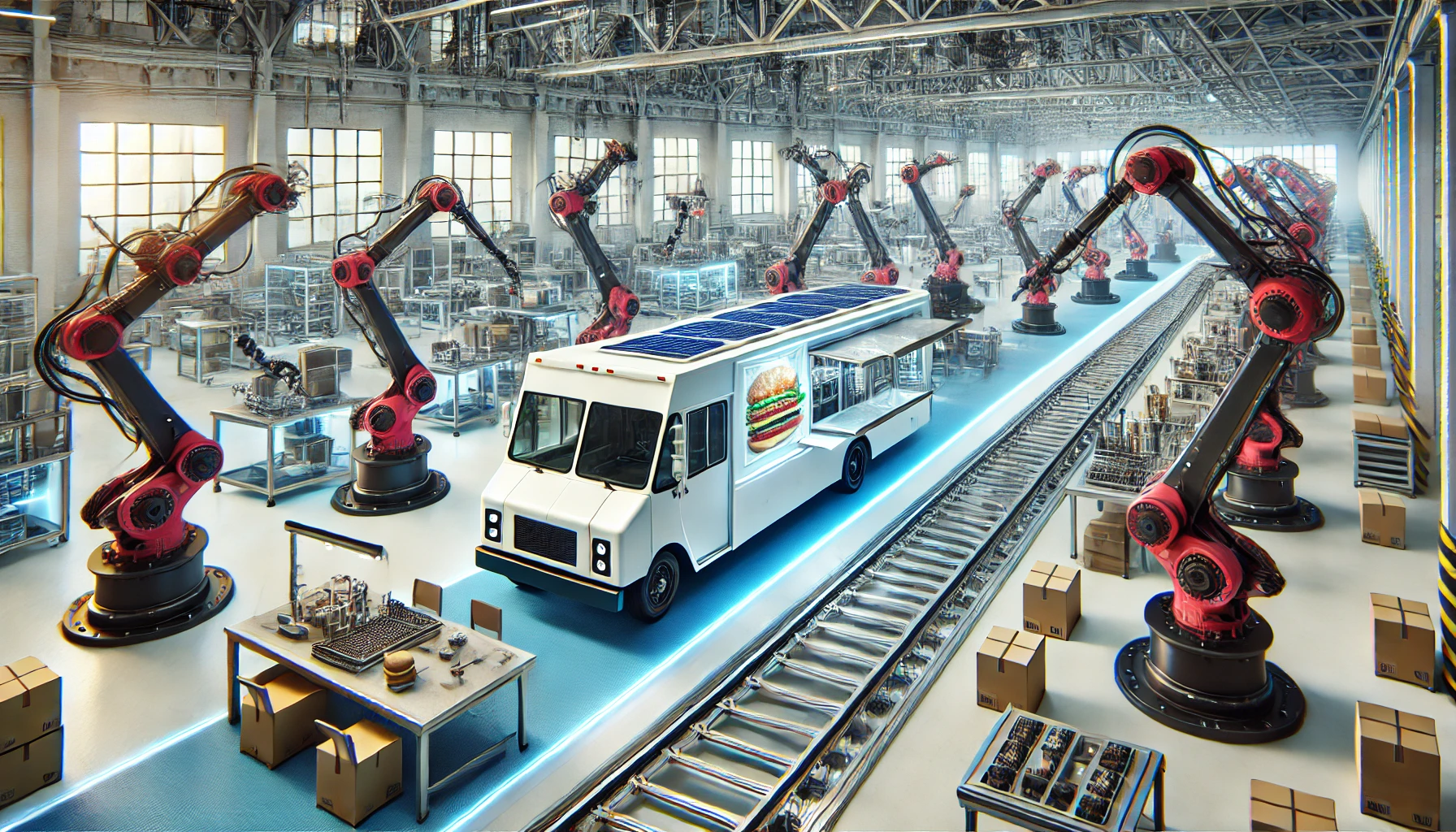The food truck industry has come a long way. What started as basic vehicles serving simple meals has evolved into mobile kitchens offering gourmet dishes and innovative cuisines. This transformation wouldn’t have been possible without technology. From advanced designs to energy-efficient systems, technology has reshaped the way food trucks are built and operated.
Why is this important? Because technology isn’t just about making food trucks look modern. It’s about solving real-world problems. It makes them more efficient, environmentally friendly, and adaptable to today’s fast-paced food scene. In this blog, we’ll explore how innovations like IoT, smart designs, and energy-efficient solutions are shaping the future of food truck manufacturing.
1.Evolution of Food Truck Manufacturing
From Traditional to Modern
Think back to the early days of food trucks. They were simple vans with minimal cooking equipment, serving quick snacks. Today, they’re mobile culinary hubs equipped with everything from ovens to refrigerators.
This evolution happened because of advancements in design and technology. Manufacturers realized that food trucks needed more than just mobility. They needed functionality and durability. Modern trucks now come with features like built-in sinks, ventilation systems, and even air conditioning.
Why Modern Technology Matters
Technology solves the challenges that food truck owners face every day. For example, overcrowded urban areas need compact trucks that maximize space without compromising functionality. Customers demand faster service, which requires efficient kitchen layouts. And let’s not forget environmental concerns—technology helps reduce emissions and energy consumption.
This transformation is evident in cities like Dubai, where food truck manufacturers prioritize smart and luxurious designs. Businesses looking for food truck rental in Dubai benefit from these advancements, ensuring they meet high standards for quality and innovation.
2. The Internet of Things (IoT) in Food Trucks
Connected Systems
IoT is changing how food trucks operate. Imagine a kitchen where all appliances are connected. The fridge tells you when supplies are running low, and the oven alerts you if it’s overheating. That’s the power of IoT.
These connected systems streamline operations and reduce human error. For example, inventory systems can automatically reorder ingredients when stock runs low.
Real-Time Data Insights
Data is king in today’s business world. IoT-enabled food trucks can track sales trends, customer preferences, and even location performance. This helps owners make smarter decisions. For instance, knowing which menu item sells best at a specific location can boost profits.
Remote Monitoring
With IoT, food truck owners can monitor their trucks from anywhere. Whether it’s checking temperature controls or receiving maintenance alerts, remote monitoring ensures smooth operations. This is especially beneficial for businesses managing multiple food trucks. It’s no wonder companies offering food truck rental in Dubai are integrating IoT into their fleet.
3. Energy Efficiency in Food Truck Design
Green Energy Solutions
Energy efficiency isn’t just a trend; it’s a necessity. Modern food trucks are adopting green energy solutions like solar panels and battery storage. These systems reduce reliance on traditional fuel sources, cutting costs and environmental impact.
Cost Savings
Energy-efficient appliances consume less power, which means lower utility bills. For food truck owners, this translates to more savings and higher profits. Over time, these savings can offset the initial cost of investing in energy-efficient technology.
Eco-Friendly Practices
Sustainability is a big deal. Customers prefer businesses that care about the environment. By minimizing carbon footprints and adopting waste-reduction systems, food trucks can attract more eco-conscious consumers. This approach aligns with the principles of a container supplier in Dubai, where sustainable solutions are gaining popularity in various industries.
4. Smart Designs for Enhanced Functionality
Ergonomic Layouts
Space is limited in a food truck, so every inch matters. Smart designs focus on creating ergonomic layouts that enhance workflow. This means placing appliances and workstations in ways that minimize movement and maximize efficiency.
Lightweight and Durable Materials
Modern manufacturing uses materials that are both lightweight and durable. This reduces the overall weight of the truck, improving fuel efficiency. At the same time, these materials ensure the truck can withstand wear and tear.
Customizable Features
One size doesn’t fit all. Smart designs allow food truck owners to customize their vehicles based on their menu and brand. Whether it’s a pizza oven or a smoothie station, customization makes the truck unique.
In cities like Dubai, food truck manufacturers excel in creating bespoke designs. Businesses working with a food truck manufacturer in Dubai can expect tailored solutions that combine luxury with functionality.
5. Automation in Food Truck Manufacturing
Advanced Manufacturing Processes
Automation is transforming the way food trucks are built. Robotic systems ensure precision, reducing the chances of errors. This speeds up production and lowers costs.
3D Printing
3D printing is another game-changer. It allows manufacturers to create custom parts quickly. Need a specific countertop or storage solution? 3D printing can make it happen. This technology also reduces waste, making the manufacturing process more sustainable.
Impact on Costs and Accessibility
Automation and 3D printing make high-tech food trucks more affordable. Entrepreneurs no longer need massive budgets to invest in modern food trucks. This accessibility is encouraging more people to enter the industry.
6. Integration of AI and Predictive Maintenance
AI-Driven Insights
Artificial intelligence helps food truck owners predict customer demand by analyzing past sales and weather patterns. This ensures they’re stocked with the right ingredients, reducing waste and boosting profits.
Predictive Maintenance
AI can identify mechanical issues before they become major problems. This means fewer breakdowns and lower repair costs. Predictive maintenance ensures food trucks stay operational, even during peak hours.
Enhanced Customer Experience
AI-powered ordering systems personalize customer interactions. For example, regular customers can receive tailored menu recommendations based on their preferences, creating a more engaging experience.
7. Enhancing Food Safety Through Technology
Temperature Monitoring Systems
Smart sensors monitor storage and cooking temperatures in real time. This ensures food safety and maintains quality standards.
Compliance with Health Standards
Technology simplifies compliance with food safety regulations. Automated systems track cleanliness and hygiene, ensuring food trucks meet industry standards.
Digital Logs
Digital tools make it easy to track maintenance schedules, storage conditions, and cleaning routines. This transparency builds trust with customers and health authorities.
8. Sustainable Manufacturing Practices
Recycled and Eco-Friendly Materials
Manufacturers are increasingly using recycled materials to build food trucks. This reduces waste and supports sustainability goals.
Minimizing Waste
Smart technologies optimize the manufacturing process, reducing material waste. This makes production more efficient and environmentally friendly.
Green Certifications
Certifications like LEED (Leadership in Energy and Environmental Design) highlight eco-conscious manufacturing practices. These certifications boost credibility and appeal to environmentally aware consumers.
9. The Future of Food Truck Technology
Augmented Reality (AR) in Truck Design
AR allows manufacturers to create virtual prototypes. This helps them plan layouts and identify design improvements before production begins.
Autonomous Food Trucks
Self-driving food trucks are on the horizon. These vehicles could revolutionize the industry, offering seamless service without the need for drivers.
Blockchain for Transparency
Blockchain technology ensures transparency in sourcing and operations. Customers can trace the origins of ingredients, building trust and loyalty.
Conclusion
Technology has redefined food truck manufacturing. From IoT and energy efficiency to AI and smart designs, these advancements make food trucks more functional, sustainable, and profitable. Whether you’re renting or owning, staying ahead of these trends is essential.
For those exploring food truck rental in Dubai or working with a food truck manufacturer in Dubai, embracing these technologies ensures they remain competitive in this fast-evolving industry. With innovations continuing to emerge, the future of food truck manufacturing looks brighter than ever.


